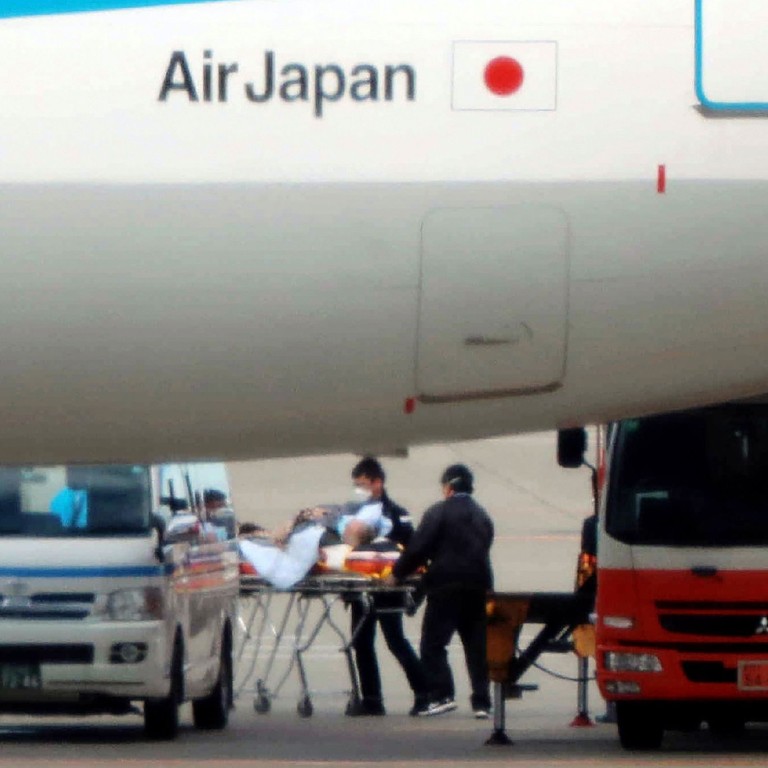
Japan bans coronavirus-infected travellers after outcry over lax response
- Evacuees from Wuhan – the epicentre of the outbreak – had earlier been allowed home despite refusing to be tested for the virus
- From Saturday, the ban will come into force alongside broad new powers to test and hospitalise travellers where necessary
Japanese evacuees describe confusion in Wuhan as infection spreads
The government’s previous positions on the coronavirus, which included allowing any evacuees with no obvious signs of the illness to go home on the understanding that they would go to a hospital if they subsequently felt unwell, has come in for public criticism.
“Their forecasting was too optimistic,” said Jun Azumi, an executive with the main opposition Constitutional Democratic Party, referring to the Abe administration’s response. Given the rapid rise in the number of Chinese tourists, what happens in China “shouldn’t be treated as happening overseas”, he added.
Following Tuesday’s evacuation flight, which had 206 Japanese on board, a second government-chartered aircraft left Wuhan on Thursday with a further 210 evacuees. Thirteen people aboard this second flight displayed symptoms of infection and were hospitalised upon arrival in Tokyo. A third plane carrying 149 people arrived on Friday at around 10:30am, the foreign ministry said.

Abe told lawmakers in an address to the Diet, Japan’s parliament, on Friday that the government’s top priority was “protecting the lives and health of the people” and it “shall decide what needs to be done without hesitation”.
The refusal of two evacuees to undergo testing for the virus was “extremely regrettable”, he said, and health authorities had “spent a long time attempting to convince them”, but as such tests are not “legally mandated … there are human rights issues,” Kyodo News quoted him as saying.
Abe further announced that a travel warning for China would be raised to level two on the country’s four-point system, advising people to “avoid travel that is not urgent or is not necessary”. Japan had already raised its travel alert for Hubei province, where the outbreak began, to a level three, warning against any travel to the region.

An official of the Health, Labour and Welfare Ministry told The South China Morning Post that “everything possible” had been done to explain how important it was that the two Wuhan evacuees be tested, but these efforts were made in vain. The official confirmed, however, that the two people – who have not been identified – changed their minds the following day and have since been tested.
The results of those tests have not yet been confirmed, she added.
The official said that the two people were not permitted to go home from the airport by public transport but were instead taken in a ministry vehicle. She was not aware if any of their family members were also at their home or whether they had come into contact with neighbours or other local people.
“We had no choice,” the official said. “Under Japanese law, we could not force them to take the test but we are right now in the process of changing the law to make it a mandatory requirement.”
For many though, that decision has come a little too late.
On Twitter, one user said “I do not want them to come back to Japan [if they] refuse the test,” while another asked, “How stupid do you need to be? That should have been required.” A third called the two unnamed travellers “so selfish”.
Condemnation of both the passengers and the government was also fierce on the Japan Today website, with many suggesting the two people at the centre of the debate should have been left in Wuhan.
“No legal obligation to force” them to take the test, wrote one, should have resulted in “no legal obligation to allow them to board the flight from China either.”
Another added, “In a public health emergency of this scale there should be no room for errors of this magnitude by the decision makers.”
“I only hope nobody dies because of the government’s lack of foresight and initiative here,” said a third.
Additional reporting by Bloomberg, Agence France-Presse

